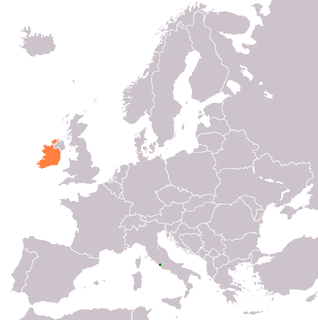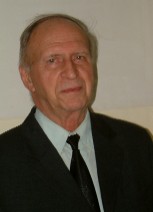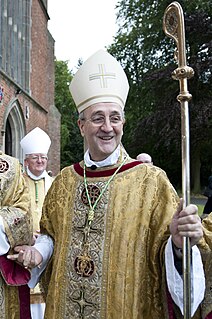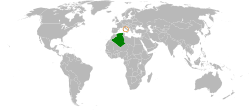
Pope Benedict XVI is a retired prelate of the Catholic church who served as the head of the church and the sovereign of the Vatican city state from 2005 until his resignation in 2013. Benedict's election as pope occurred in the 2005 papal conclave that followed the death of Pope John Paul II. Benedict chose to be known by the title "pope emeritus" upon his resignation.

Traditionalist Catholicism is characterized by beliefs, practices, customs, traditions, liturgical forms, devotions, and presentations of Catholic teaching before the Second Vatican Council (1962–1965), in particular attachment to the Tridentine Mass, which traditionalist Catholics call "the Latin Mass", "the traditional Mass", "the ancient Mass", "the immemorial Latin Mass", "the Mass of All Time", "the Mass of the ages" or "the Mass of the Apostles", "the Traditional Latin Mass", or "the Extraordinary Form of the Roman Rite".
The Catholic Patriotic Association, abbreviated CPA, is a state-sanctioned organization of Catholicism in the People's Republic of China. It was established in 1957 after a group of Chinese Catholics met in Beijing with officials from the Chinese Communist Party and the Religious Affairs Bureau. It is the main organizational body of Catholics in China officially recognized by the Chinese government. It is not formally recognized by the Vatican.

The Catholic Church in China has a long and complicated history. Roman Catholicism has existed in China in various folk forms since the Tang Dynasty in the 7th century.
The Pontifical Commission Ecclesia Dei was a commission of the Catholic Church established by Pope John Paul II's motu proprioEcclesia Dei of 2 July 1988 for the care of those former followers of Archbishop Marcel Lefebvre who broke with him as a result of his consecration of four priests of his Society of St. Pius X as bishops on 30 June 1988, an act that the Holy See deemed illicit and a schismatic act. It was also tasked with trying to return to full communion with the Holy See those traditionalist Catholics who are in a state of separation, of whom the Society of Saint Pius X (SSPX) is foremost, and of helping to satisfy just aspirations of people unconnected with these groups who want to keep alive the pre-1970 Roman Rite liturgy.

Michael Louis Fitzgerald is a British cardinal of the Roman Catholic Church and an expert on Christian–Muslim relations. He has had the rank of archbishop since 2002. At his retirement in 2012, he was the papal nuncio to Egypt and delegate to the Arab League. He headed the Pontifical Council for Interreligious Dialogue from 2002 to 2006. Pope Francis raised him to the rank of cardinal on 5 October 2019.

The Catholic Church in Malaysia is part of the worldwide Catholic Church, under the spiritual leadership of the Pope in Rome. The Apostolic Nuncio to Malaysia currently is Archbishop Wojciech Załuski, who was appointed on the 22 September 2020; The resident ambassador of Malaysia to the Holy See is Westmoreland Anak Edward Palon.

Dominique François Joseph Mamberti is the Prefect of the Apostolic Signatura in the Roman Curia. He was elevated to the rank of cardinal by Pope Francis in 2015.
The post Vatican II history of the Catholic Church includes the recent history of the Catholic Church since the Second Vatican Council (1962–1965).

Holy See–United Kingdom relations are foreign relations between the Holy See and the United Kingdom.

Holy See–Israel relations are the diplomatic relations between the Holy See and the State of Israel, as well as a concordat defining the status and fiscal and property rights of the Catholic Church and related entities within Israel. Formal diplomatic relations between the two states were established after the adoption of the Fundamental Agreement by the two States on 30 December 1993. A Vatican Nunciature in Israel and an Israeli embassy in Rome were simultaneously opened on 19 January 1994. From the Vatican's point of view, the establishment of diplomatic relations between the two states is part of the Christian–Jewish reconciliation; and from the Israeli point of view, the normalization of diplomatic relations. Prior to the establishment of diplomatic relations, the interests of the Catholic Church in Israel were looked after by the Apostolic Delegate to Jerusalem and Palestine, the Latin Patriarch of Jerusalem and the Custodian of the Holy Land, all of which continue to function.

Holy See–Ireland relations are foreign relations between the Holy See and Ireland. The majority of Irish people identify as Roman Catholic, according to census data. However, views on actual church dogma both on social and spiritual matters varies significantly, and weekly mass attendance is below 40%. The Holy See has an Apostolic Nunciature in Dublin.

Holy See–Vietnam relations are foreign relations between the Holy See and Vietnam. Diplomatic relations have never been established between the two entities, but Vietnam is the only communist state in Asia to have unofficial and bilateral relations with the Vatican.

Holy See–Turkey relations are foreign relations between the Holy See and Turkey. Both countries established diplomatic relations in 1868, originally between the Holy See and the Ottoman Empire. The Holy See has a nunciature in Ankara. Turkey has an embassy in Rome.
The relations between Pope Benedict XVI and Judaism remained fairly good, although concerns were raised by Jewish leaders over the political impact of Traditionalists in the Church during the papacy of Benedict.

Pope Benedict XVI, who led the Roman Catholic Church as Pope from 2005 to 2013, continued manouevring the Church through the dynamics of modernity, which the Church had begun engaging in with the Second Vatican Council. Because the question of religious pluralism is a key issue raised by modernity, ecumenism, the establishment of harmony and dialogue between the different Christian denominations, is a significant concern of a post Second Vatican Council Church. Pope Benedict XVI's approach has been characterised as leaning toward the conservative while still being expansive and engaged, involving the full breadth of Christendom, including the Orthodox Churches and Protestant churches, as well as freshly engaging with other Christian bodies considered by Roman Catholics to be more heterodox, such as The Church of Jesus Christ of Latter-day Saints.

Henri Antoine Marie Teissier was a French-Algerian Catholic Bishop of Algiers and Archbishop Emeritus of Algiers.

Antonio Mennini is an Italian prelate of the Roman Catholic Church. He served as the Nuncio to Great Britain from 18 December 2010, having been appointed by Pope Benedict XVI, until 6 February 2017 when Pope Francis transferred him to work in the Secretariat of State in Rome where he is responsible for relations between the Holy See and Italy.

Bosnia and Herzegovina and the Holy See have maintained diplomatic relations since the former declared independence in 1992. The two states have signed a concordat, and there have been three papal visits to the multiconfessional Bosnia and Herzegovina. The relations with the Holy See have generally been fostered primarily by the Bosnian Croat and Bosniak officials, but sometimes aggravated by Bosnian Serb officials.

Holy See–Ivory Coast relations refers to the current relationship between the Holy See and the Republic of Ivory Coast, which was established in 1970. A significant amount of Roman Catholics live in Ivory Coast, being nearly one-fifth of the population, and the two states are considered to have a cordial relationship.

















